How to Fight the Flies: Professional Tips for the Summer
Flies are a major pain no matter how you look at them. They buzz in our faces, cause painful bites, and spread dangerous diseases. That is why it’s extremely important that you protect your horses from these nasty little annoyances. We spoke with Dr. Erin Denney-Jones of the Florida Equine Veterinary Service and Dr. Laura Molony of Georgia Equine Veterinary Services to get their professional tips for how to fight the flies this summer.
Battling the Bugs: What harm do they cause?
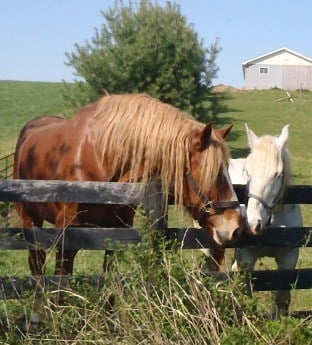
They also have the potential to carry dangerous diseases. Dr. Denney-Jones explained, “The number one disease that we’re concerned about is EIA (Equine Infectious Anemia), which most people will know from the Coggins test.”
A yearly Coggins test is usually required before a horse can attend shows or move into a new boarding facility to prevent the spread of the disease. If just one horse in the barn has the virus, a stable fly can easily transfer it to other horses in the barn. It’s a good idea to carry your negative Coggins paper work in your horse trailers.
The next nuisance is a Fly Bite Allergy or Culicoides Hypersensitivity. This is also known as Sweet Itch. “Some horses develop a dermatitis allergy,” shared Dr. Denney-Jones. “Each person and horse is different in how they get an allergy.” Some horses are more sensitive than others and the sensitivity can develop or worsen with age or a change in environment.
She finished with one important point. “The physical harm that the flies cause the horse can also be physical harm on us because they are swishing their tail and kicking out at flies.” Dr. Denney-Jones explained that a horse that is kicking out at flies could easily cause their owner harm if they are in the wrong place at the wrong time.
6 Simple Tips to Fight the Flies
1. Find An Effective Fly Spray: Ingredients Matter
There are a variety of fly spray products on the market so it is helpful to know what ingredients work the best. Dr. Denney-Jones feels that there are only a few fly sprays that seem to do a really good job. “For those that are sensitive, we always recommend a permethrin based fly spray that 2% or greater.” The other ingredient you will often see in fly sprays is pyrethrin. She shared, “They don’t seem to last that long on the horse.”
Dr. Molony typically uses the pyrethrin based sprays but agrees that the permethrin sprays tend to last longer. “I recently allergy tested a horse that was having severe skin problems. One of the allergens he tested positive for was permethrin. The owner immediately eliminated the fly spray she was using, found a *natural* recipe (apple cider vinegar, oils) and had the fly spray system changed out to a more natural product. This has definitely helped improve the horse’s skin.”
Natural or holistic fly sprays, often containing essential oils, don’t always work well, so it is important to try the products to see if they really work before you commit to long-term use. Dr. Molony continued, “There are roll on products that can go around eyes or in ears. There are also spot on treatments that can be used twice monthly and seem to have good effectiveness.”
2. Fortify your indoor environment
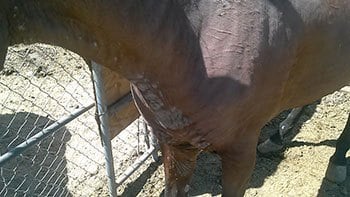
When asked what methods she likes to reduce flies in the barn, Dr. Denney-Jones said, “Anything to keep the flies out!” This includes hanging fly tapes, window screens, blowing fans, bug zappers, and fly pest systems that regularly spray out pyrethrin spray.
Dr. Molony agrees, “Fly systems that can be installed in the barns that spray are wonderful. There is also a company called Fly Predator which is an insect that eats the larvae of flies. They work really well as well.” She added that there are even some feeds that you can use for your horses that have an effect on flies. One of the simplest kinds incorporates garlic.
3. When you purchase fly protective gear, think “Zebra!”
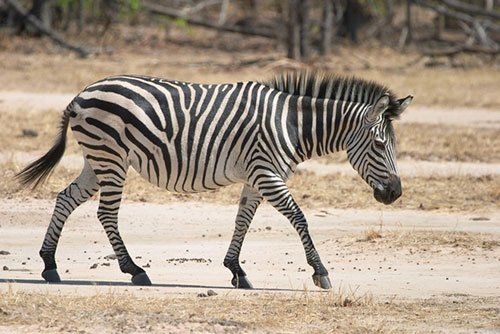
This shows that lighter colored horses or those with a zebra pattern attract the least number of biting horse flies. The researchers eventually determined that the reason had to do with the way the “light polarization” attracted the flies. Long story short – buy fly blankets and masks in light colors - or better yet zebra patterns - to keep the horse flies away!
When you choose these items for your horses, be careful to find ones that fit properly. Horses can easily get caught up in loose straps if the fly sheet doesn’t fit correctly. Dr. Denney Jones said, “I’m a big fan of fly masks! I advocate that above anything else. They make so many different types now that there has to be one that would suit your horse’s needs.” Dr. Molony also explained that protective fly leg wraps might be an option if your horse is extremely sensitive to bites.
4. Consider your environment: Is there a marshy area nearby?
Both of our vets hail from the Southern Gulf states so they have up-close experience dealing with flies that enjoy swampy wet environments. Flies like these types of environments because they provide the perfect breeding ground. Higher and dryer areas with more winds would experience lower fly populations.
So when you are choosing your next property, think a bit about the environment into which you are placing your horse. Is there a mucky stream nearby? Is there a wetland area next to your pasture? If possible, avoid these areas and opt for environments that are dryer with a steady breeze to deter the flies.
5. Clean out the manure: Barn management makes a big difference
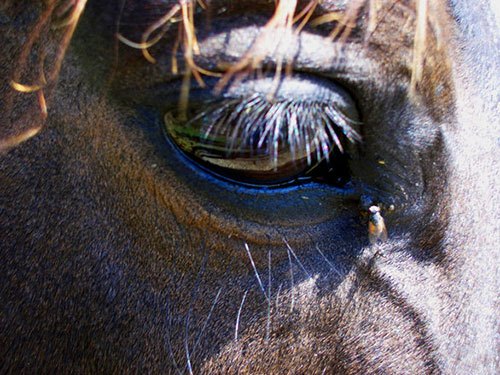
The manure should be dumped many yards from the barn. Consider manure management before you move to a new boarding facility. Sometimes a horse that didn’t have problems or sensitivities before can develop problems if they move to a barn with more manure management.
Another barn management topic to consider is the turn out schedule. Since flies feed most at dusk and dawn, bringing the herd indoors before it gets dark can keep them from the flies. Dr. Denney Jones said, “It’s paramount that they get them in and underneath some fans in an area that is not out exposed to the environment. It will make a difference.”
6. Remember Mosquitos!
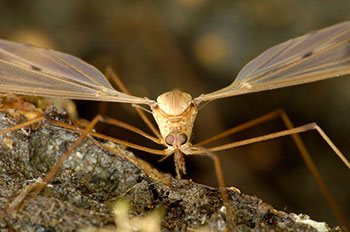
The best way to combat mosquitos is to prevent buildup of stagnant water pools where mosquitos thrive. If your roof run off creates a muddy area, be sure to fill it with rocks, pebbles, or sand to dry it up.
Also, think about your water buckets sitting out in the pastures. “I dump my bucket out at night and refill in the morning,” Dr. Denney-Jones shared. She said that it takes extra time but it’s well worth it in the long run.
Flies are a major pain but every horse owner needs to find ways to fight back. Dr. Denney-Jones explained, “It’s a management headache for owners but they have to embrace it because it’s part of owning a horse. In the long run it does pay off.”

